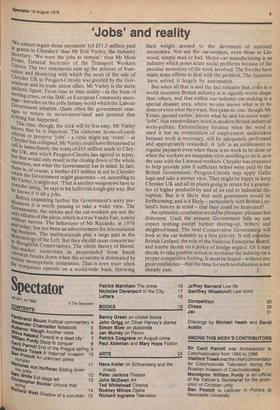'Jobs' and reality
We cannot regain those payments' (of £51.5 million paid In grants to Chrysler): thus Mr Eric Varley, the Industry Secretary. 'We want the jobs to remain': thus Mr Moss T,vans, General Secretary of the Transport Workers unions. The two statements sum up the mixture of frustration and blustering with which the news of the sale of Chrysler UK to Peugeot-Citroen was greeted by the Government and its trade union allies. Mr Varley is the more Pathetic figure. From time to time reality — in the form of sterling crises, or the IMF, or European Community meet'rigs — intrudes on the jolly fantasy world which the Labour Government inhabits. Quite often the government manages to return to never-never-land and pretend that tithing has happened. This time, though, the trick will be less easy. Mr Varley 'flows that he is impotent. The elaborate house-of-cards scheme to preserve 'jobs' — a cynic might say 'votes' — at Chrysler has collapsed. Mr Varley could have threatened to Call in immediately the loans of £65 million made to Chrysler UK, and which Peugeot-Citroen has agreed to repay, out that would only result in the closing down of the whole operation, not what the Government has in mind. In fact, there is, of course, a further £45 million in aid to Chrysler Which the Government might guarantee — or, according to Mr Varley, it might not. 'That is another weapon we have to co‘ nsider using,' he says in his ludicrous tough-guy way. But ne knows it is all a joke. Before examining further the Government's sorry predicament it is worth pausing to take a wider view. The Government the unions and the car-workers are not the °lY villains of the piece, which is a true Vanity Fair, a story a Without heroes. The behaviour of Mr Riccardo, in 1976 Ln. d today, has not been an advertisement for international °1g business. The multinationals play a large part in the d , t ern,onology of the Left. But they should cause concern too thoughtful Conservatives. The whole theory of liberal, l_ree-market economics as propounded from Smith °_nwards breaks down when the economy is dominated by tuhtitsize monopolistic companies. That is even truer when e companies operate on a world-wide basis, throwing their weight around to the detriment of national economies. Nor are the car-workers, even those at Linwood, simply mad or bad. Motor-car manufacturing is an industry which poses acute social problems because of the peculiar monotony of the work involved. The Swedes have made some efforts to deal with the problem. The Japanese have solved it largely by automation.
But when all that is said the fact remains that, even in a world recession British industry is in signally worse shape than others, and that within our industry car-making is a special disaster area, where no one knows what is to be done or even what they want. Not quite no one, though. Mr Evans, quoted earlier, knows what he and his union want: 'jobs', that extraordinary word in modern British industrial socio-politics. Extraordinary because when the word is used it has no connotation of employment undertaken because work is necessary, will be adequately performed and appropriately rewarded. A 'job' is an entitlement to regular payment even when there is no work to be done or when the workers are incapable of or unwilling to do it, as is the case with the Linwood workers. Chrysler was prepared to help provide jobs if sufficient bribes were paid by the British Government. Peugeot-Citroen may apply Gallic logic and take a sterner view. They might be happy to keep Chrysler UK and all its plants going in return for a guarantee of higher productivity and of an end to industrial disruption. But is it likely that such guarantees would be forthcoming; and is it likely — particularly with British Leyland's history in mind — that they could be honoured? An optimistic conclusion would be pleasant: pleasant but dishonest. Until the present Government falls we can expect nothing except further shoring-up, bribery and sleight-of-hand. The next Conservative Government will look at the car industry as a first priority. It will emine British Leyland, the role of the National Enterprise Board, and maybe decide on a policy of benign neglect. Or it may decide to take positive action to revitalise the industry on a proper competitive footing. It must be hoped —without any great confidence — that the time for such revitalisation is not already past.


































 Previous page
Previous page